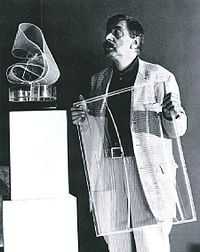Sante Monachesi
| Sante Monachesi | |
|---|---|
 Sante Monachesi | |
| Born |
1910 Macerata, Italy |
| Died |
1991 Rome, Italy |
| Nationality | Italian |
| Field | Painting, Sculpture |
| Training | Scuola romana, Expressionism |
| Movement | Contemporary, Futurism |
| Works |
Evelpiuma (1970) |
Sante Monachesi (1910-1991), was an Italian painter belonging to the modern movement of the Scuola romana (Roman School) and founder in 1932 of the Movimento Futurista nelle Marche (Futurist Movement of Marche).[1]
Life and career
Monachesi studied at the Centro Sperimentale di Cinematografia (Experimental film centre or Italian National film school) in Rome. In the 1930s he embraced Futurism with spiralist and diagonal shapes both in painting and in sculpture, experimenting with aluminium in a mobile light.
An important representative of Aeropittura (Aeropainting), in 1936 he exhibited at Biennale di Venezia and in 1937 at the World Expo of Paris.
Immediately after World War II, Monachesi did expressionist and fauve painting, also as a member of the Scuola Romana, becoming part of the group of "Balduina" with David Grazioso and Ferdinando Bellorini, but it was especially in plastic sculpture that his research became innovative. He explored new materials and compositions, and on the occasion of the Moon landing, he founded the Agrà Movement, a futurist current looking at these exalting successes of technology and thus expresses in artwork the absence of gravity, the Zero-G that by subtracting from bodies their terrestrial weight, proposes to free man and art from all conditioning.
Monachesi's pieces in coloured methacrylate are truly dynamic action-sculptures: "... the artist moulds the transparent and fluorescent perpex sheet, and succeeds in capturing and freeing the void of the full figure it circumscribes," (Floriano de Santis, 1990).[2] Perspex and evelpiume introduce two new materials into Art: rubber foam and polymethacrylate, neglected by the contemporary figurative language until 1959.
With Monachesi we are introduced to the "nomadic sculptures", where the artist ties and melts the foam sheet, continuously creating new forms and shapes. The definition of "primary forms of matter and cosmos" given by art critic Franco Passoni,[3] well qualifies the Jesolo Exhibition of 1978, which Monachesi entitled To Tie & To Dissolve.
Notes
- ↑ Cf. E. Villa ed., Sante Monachesi, Rome, 1970, Intro.
- ↑ Cf. S. Papetti, ed., Monachesi. Gli anni Quaranta e Cinquanta (Monachesi. The 1940s and 1950s), 1999.
- ↑ Cf. F. Passoni, Art and plastics, 1975.
 Da un Evelpiuma (From an Evelpiuma, 1970) |
Exhibitions
(partial listing)
- Ancona 1970, Galleria dei Portici: "Sante Monachesi"
- Jesolo 1978, "Legare e sciogliere" (To Tie & To Dissolve)
- Milan 1982, Palazzo Reale Anni Trenta: "Arte e Cultura in Italia"
- Civitanova Marche 1999, Chiesa di S. Agostino: "Monachesi. Gli anni Quaranta e Cinquanta"
- Rome 2006, National Gallery of Modern Art: "Sante Monachesi - Perspex e evelpiuma 1959–1969"
Bibliography
- (Italian) Emilio Villa ed., Sante Monachesi, Carte Segrete, Rome, 1970
- (Italian) Emilio Villa - Elverio Maurizi, Monachesi, La Nuova Foglio, Pollenza, 1975
- (Italian) Franco Cagnetta, Monachesi sconosciuto, Edizioni La Gradiva, Rome, 1977
- (Italian) Franco Cagnetta ed., Monachesi, Edizioni La Gradiva, Rome, 1977
- (Italian) Franco Cagnetta ed., Cento scritti di e su Monachesi, Edizioni La Gradiva, Rome, 1978
- (Italian) Various Authors, Legare e sciogliere: l'evelpiuma e l'universo agrà di Monachesi , Marsilio, Venezia, 1978
- (Italian) Simonetta Lux (ed.), Sante Monachesi, 1910-1991: l'insolenza, Giorgio Corbelli, Brescia, 1996
- (Italian) Maria Vittoria Marini Clarelli - Marina Gargiulo (eds.), Sante Monachesi: perspex e evelpiuma, 1959 - 1969, De Luca Editori d'Arte, Rome, 2007
- (Italian) F. Desideri, ed., Architettura di S. Monachesi, Via MarguttaMargutta Duemila, Rome, 1958
- (Italian) S. Papetti, ed., Monachesi. Gli anni Quaranta e Cinquanta, catalogue, Federico Motta 1999
See also
- Scuola Romana
- Futurism
- Aeropittura (Aeropainting)
- Expressionism
- Fauvism
| Wikimedia Commons has media related to Sante Monachesi. |
External links
- (English) Tate Gallery, Scuola romana entry
- (English) Roman School, art note on the initial 19th century movement. Accessed 24 May 2011
- (English) Art Videos for Sante Monachesi. Accessed 25 May 2011
- (Italian) Sante Monachesi, bio on the Marche Region portal.
- (Italian) Museum of the Scuola Romana, official site
- (Italian) Museum's excerpts of Scuola. Accessed 24 May 2011
- (Italian) Scuola romana, dedicated website
- (Italian) Glossary entry
- (Italian) Press Release, 14 October 2006, National Gallery of Modern Art, Rome. Accessed 25 May 2011
| ||||||||||||||||||||